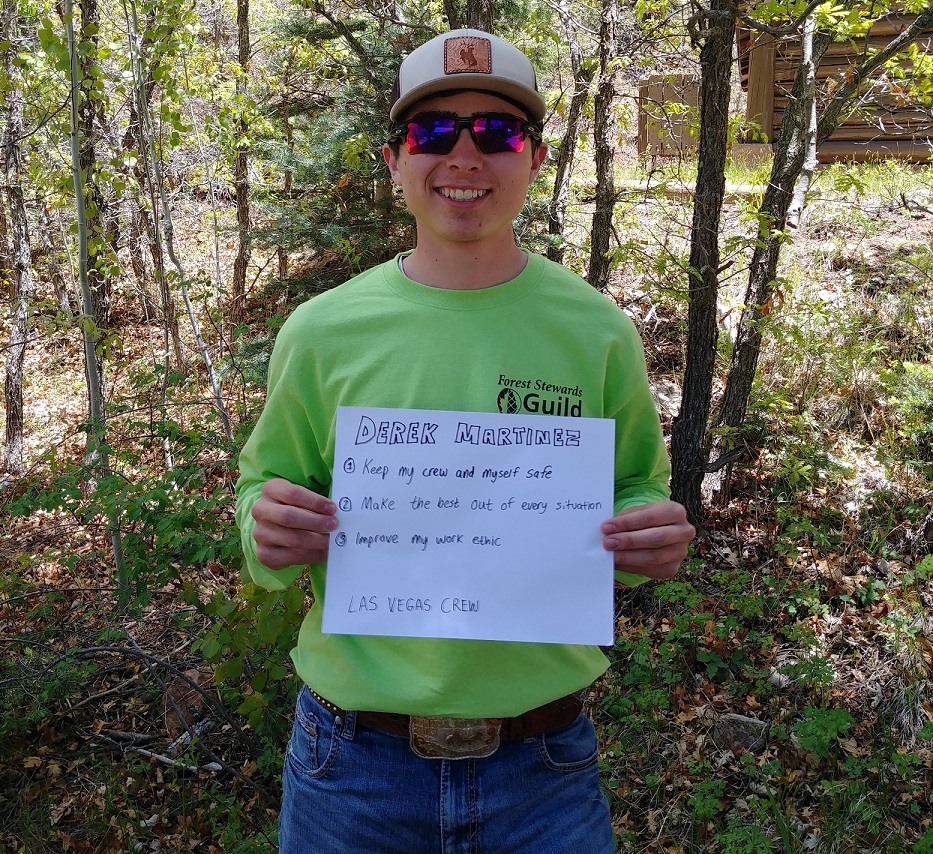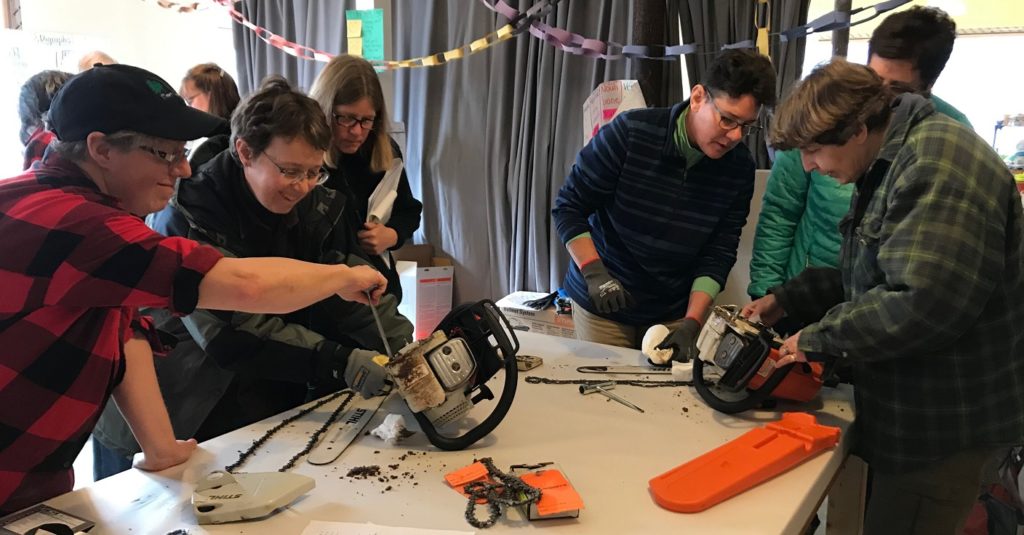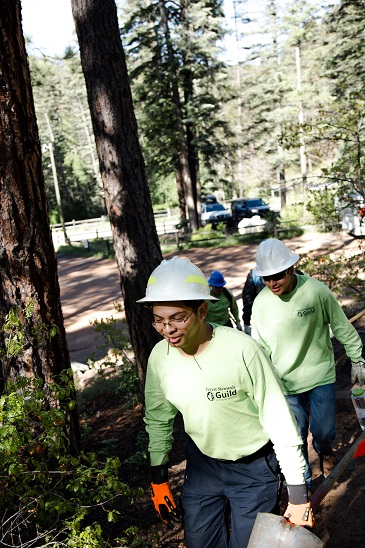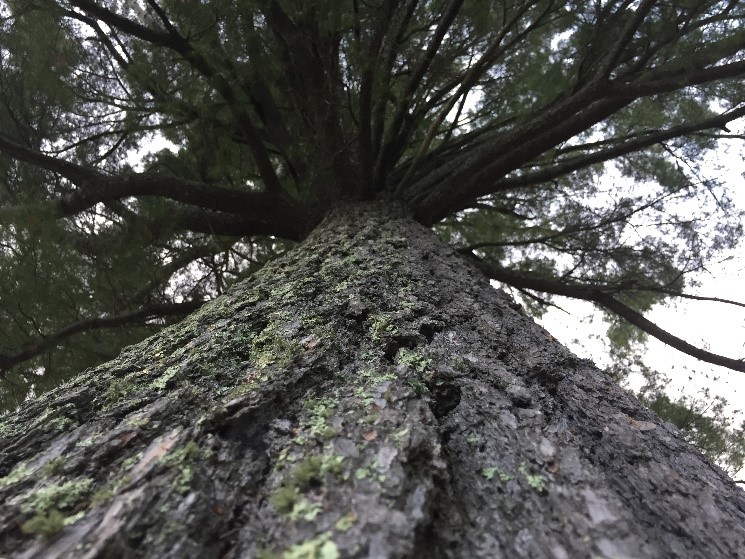Diversity, Equity, Inclusion, and Justice committments at the Guild
Written by Leonora Pepper and Colleen Robinson
Continuing the momentum
The Forest Stewards Guild is committed to supporting Black, Indigenous, and other People of Color in the environmental field. The tragic events of last summer and the global movement for racial justice, prompted self-reflection and action at the Guild. We have formalized some internal changes to make the Guild a more inclusive organization, created spaces for continued conversation and learning, and developed new programs to increase diversity of the Guild’s staff.

Staff engagement
Recognizing the need for greater dialogue in our organization around diversity, equity, inclusion, and justice (DEIJ), we started an internal communication channel where staff share resources, articles, and topics for discussion. We have shared Indigenous reading lists, a story map on fire from an Indigenous perspective, best practices, podcasts, and more. We established recurring staff conversations wherein land acknowledgements and inclusive communication have been discussed at length.
In December 2020, we engaged 19 staff members in an active bystander training to better equip ourselves to address bias, discrimination, and injustice that we witness or unintentionally produce. To follow this up, we are developing an Active Bystander curriculum. This curriculum will allow us to hold workshops on becoming an active bystander to young people employed in our Forest Stewards Youth Corps (FSYC) program, as well as to staff and program partners as needed. Our hope is that active bystander workshops will support positive culture and dynamics in the FSYC crews and provide these young people with additional tools and empowerment for work and for life.

It also became clear to us in 2020 that the female members of our FSYC crews would benefit from extra support and mentorship. These largely Hispano and Indigenous young women are a minority among their male peers, and they are working in the worlds of natural resource management and wildland fire—fields that are traditionally male-dominated. We held a series of zoom calls with these young women, other women on Guild staff, and women in the wildland fire world. The calls offered a platform to air frustrations, share suggestions, and offer encouragement. We seek to continue to elevate and support young women from rural communities of New Mexico in pursuing environmental careers.
A brand-new program in 2021 will provide mentorship by Guild staff to support the best and brightest from our youth programs to participate in Guild work throughout the year. The goal of the Forest Stewards Mentorship Program is to provide a pathway for these youth to become Guild staff and leaders.
 Communications
Communications
We regard our organization as a forward-thinking voice in the forestry world and intend for our communications to encourage broader movement toward efforts we feel are critical in our field and society. In June of 2020, we posted a statement on our website regarding the link between racial justice and socially responsible forestry. In July, our e-newsletter included an article on understanding the Indigenous context for the places we work. Some of our staff have included vetted land acknowledgements in meetings and webinars and we are working to include this more, because much of our work occurs on both private and public lands. There is more to come, and we hope to provide leadership toward a more just and self-aware professional field.
Given our potential for greater reach and impact through our national, 600-person membership from the fields of forestry, land management, and conservation, we’ve focused on DEIJ in our Membership and Policy Council. The Council will continue to explore this theme, and the Guild’s Board of Directors is actively recruiting members who will bring new perspectives to our organization’s governance.
Organizational structures
In July 2020, we engaged in an internal process of DEIJ visioning and goal setting for our organization. This road map will support our actions as we identify and secure resources to help us implement changes to how we operate and are structured.
We have integrated DEIJ into our standard operating procedure (SOP) for proposal development. As a result, DEIJ will be considered and evaluated at the start of every project we implement. Specifically, this requires us to assess the potential for project outcomes and deliverables to further our DEIJ goals.
Our new SOP for hiring supports our efforts to advertise jobs more widely—particularly in places where we can recruit from communities underrepresented in the environmental field. For example, we are an active partner in the Diversity Joint Venture for Conservation Careers website, which works to strengthen the conservation workforce by increasing diversity, equity, and inclusion. In autumn 2020, we implemented a paid family leave policy to make working at the Guild more welcoming to all and updated the official holidays we recognize to better align with our organization’s values.

Finally, in the funding opportunities and projects that we pursue, we endeavor to build in capacity to address issues of diversity, equity, inclusion, and justice as integral components of how we operate. Examples of what we have built into pending proposals so far are in this more complete report of our DEIJ efforts thus far.
Challenges
As a small non-profit organization, we are challenged in our DEIJ work due to mostly project-specific funding, so we keep looking for support at the project level. We are also looking to build our network of connections with people whose work focuses on helping organizations such as ourselves become more supportive and reflective of the communities with which we work.
Stay tuned for our continued updates on efforts and please let us know if you have resources, examples, or ideas to share!
